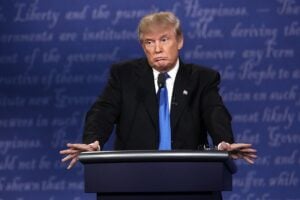[ad_1]

(Photo by Win McNamee/Getty Images)
Donald Trump’s lawyers closed out a batshit week with a filing so insane that almost defies characterization. The document is styled as reply brief in the appeal to the DC Circuit of Judge Tanya Chutkan’s limited gag order in the election interference case. But it fails to address the special counsel’s answer in any meaningful fashion. Instead Trump’s lawyers mimic their client, lobbing overheated rhetoric about “placing a gag order between the leading candidate for President and the American electorate” and shouting BRANDENBURG STANDARD over and over again.
“The Gag Order installs a single federal judge as a barrier between the leading candidate for President, President Donald J. Trump, and every American across the country,” they begin. “The district court had no business inserting itself into the Presidential election, just weeks before the Iowa caucuses.”
The Iowa caucuses are on January 15, and the gag order was imposed on October 17, but this way madness lies. Well, to be fair, all ways madness lies.
The document argues that it’s been three whole months since one of Trump’s deranged followers left a messagee for the trial judge saying, “Hey you stupid slave n****r . . . . If Trump doesn’t get elected in 2024, we are coming to kill you, so tread lightly, b***h. . . . You will be targeted personally, publicly, your family, all of it.” And isn’t that outside the statute of limitations, along with all the death threats and harassment election officials got in 2020 after being targeted by the former president for doing their jobs?
Plus, that death threat to the trial judge preceded almost all of the incendiary statements pointed out by prosecutors, so, how can it be Trump’s fault? And anyway, isn’t it a heckler’s veto to stop a defendant from telling his heavily armed supporters that a witness against him should be executed, just because they might actually do it?
Trump’s appellate lawyers, experienced counsel from Missouri, picked up right where John Lauro and Todd Blanche left off, insisting that the “substantial likelihood of material prejudice” standard for gag orders set out in Gentile v. State Bar of Nevada, 501 U.S. 1030 (1991), only applies to attorneys. They insist that the appropriate comparison is Nebraska Press Assn. v. Stuart, 427 U.S. 539 (1976), where the Supreme Court invalidated a gag order on the media as an unlawful prior restraint. Nothing short of criminal incitement under the Brandenberg standard is fair game, they insist, failing to grapple with logical conclusion that all gag orders would be definitionally unnecessary if the defendant had to commit criminal incitement to violate them.
As the special counsel pointed out in his answer, the Judicial Conference Committee tasked each District Court in 1980 with developing rules to deal with “extrajudicial statements by parties and witnesses,” and even pointed to Nebraska Press Assn. as an example of conduct which should be outside the local rule. In response, the US District Court of the District of Columbia enacted Local Criminal Rule 57.7(c), which reads:
In a widely publicized or sensational criminal case, the Court, on motion of either party or on its own motion, may issue a special order governing such matters as extrajudicial statements by parties, witnesses and attorneys likely to interfere with the rights of the accused to a fair trial by an impartial jury, the seating and conduct in the courtroom of spectators and news media representatives, the management and sequestration of jurors and witnesses, and any other matters which the Court may deem appropriate for inclusion in such an order.
Judge Chutkan’s order was guided by this rule and Gentile, as the prosecution noted in its brief. And perhaps there is a good argument that Rule 57.7(c) authorizes unconstitutional prior restraints, but, if so, Trump’s lawyers never made it. Neither their original brief nor this reply mentions Rule 57.7(c) at all. The closest that they get is a bizarre claim that gag orders exist only to protect the right of the defendant to a fair trial, and Trump’s case isn’t prejudiced by allowing him to scream at Mark Meadows on Truth Social that only “weaklings and cowards” take immunity deals and testify against their friends.
The motion is also very funny — if not intentionally.
The prosecution likens President Trump’s speech to Henry II’s “meddlesome priest” comment—overlooking the difference in continents, countries, and just a few historical developments since 1170, such as the Declaration of Independence and the adoption of the First Amendment to our United States Constitution.
Is Mark Meadows a priest? No! Did Trump say Gen. Milley was meddlesome? No, he said he should be executed. Case closed!
There’s also a not inconsiderable amount of word salad.
The prosecution contends that “it is the defendant’s own conduct that is the source of prejudice.” On the contrary, the prosecution and the district court have created this First Amendment trainwreck by insisting on trying President Trump only seven months after the indictment, on March 4, 2024, at the height of campaign season. Indeed, this trial schedule is so aggressive and unrealistic that it was previously unheard-of for a complex case with nearly 13 million pages of discovery and hundreds of potential witnesses.
What does the timing of this trial have to do with Trump intimidating witnesses on social media?
Perhaps we’ll find out on Monday when the case goes before Judges Millet, Pillard, and Garcia. Or maybe we’ll just get more shouting about the Brandenberg standard.
Yeah, probably that last one.
US v. Trump [Circuit Docket via Court Listener]
Liz Dye lives in Baltimore where she writes about law and politics.
[ad_2]




